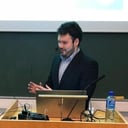Mentoring someone outside of your company can be a really rewarding experience which helps you learn too.
My first opportunity to do this came about through luck rather than planning.
When I returned to a technology role, as CTO at Unmade in 2018, I committed to make more of an effort to build professional relationships with people outside my organisation. I am not confident in group networking events and far prefer one-to-one conversations. I have been finding opportunities to meet more people (both people I already knew and new people) for coffee or lunch this year.
One such meeting was with Anna, a senior leader in a large engineering team. When we met, Anna was clearly distracted by an issue she was facing at work that day. We ended up just talking about this and I was able to give her some practical advice which she found very helpful. This made us think that it would be valuable to set up a mentoring arrangement.
What did we do?
We started by meeting for an hour to discuss how we would arrange our mentoring relationship. The key points to this were:
- Purpose: Anna shared what she wanted to get from mentoring so that we could work towards a common goal
- Confidentiality: I committed to treating everything Anna told me in the strictest confidence which was essential to enable her to be honest with me
- Commitment: We agreed that if Anna decided on a course of action in one of our sessions, then her only responsibility for carrying it out was to herself
- Limits: We agreed that we would have a limited number of sessions to reduce the risk that, over time, it slowly became less and less useful but continued through inertia or social obligation
- Feedback: We agreed that Anna would give me some simple feedback after every session so that if the sessions stopped being useful we would bring the mentoring arrangement to an early end.
We also agreed on the rough frequency and where and when we would meet for the 5x75 minute mentoring sessions that we had planned.
The time we spent setting expectations was really valuable and we both thought, in retrospect, that it may have been useful for us to have spent a little more time making sure we were clearer on this.
We settled into a routine in these sessions. We started by making tea and coffee and generally chatting about how we were both doing in order to get comfortable with one another again.
Then, usually, Anna would let me know about the impact of our previous session by sharing what had happened as a result of our conversations and the decisions she had made. This was really useful in that it gave me insight into what was working or not working for her and also helped me understand how the situations she was facing were changing.
Finally, we discussed the current challenges that Anna faced. Much of my work here was careful listening, being curious, asking questions, challenging assumptions and reflecting back what I had heard in order to help Anna clarify her thinking and understanding. This is where, in many ways, my not working with Anna felt like an advantage because not knowing her company or colleagues forced me to ask, rather than assume, what was going on. Once we better understood the issues we would discuss potential courses of action for her based on our own experiences.
After each session I wrote some very brief notes for myself so that I would be able to refresh my memory before the next session. I also sent Anna a short questionnaire to reflect on the session and offer feedback within a few days, the key question being “on a scale of 1-5 how valuable a use of your time was the session?”. The advantage of doing this offline were that it slightly reduced the social pressure to respond positively and also gave Anna time to reflect.
How was it valuable for me?
I found the experience of being a mentor really valuable in a number of ways.
Firstly, Anna is very thoughtful and articulate and has her own set of experiences which I felt able to learn from in the course of our discussions. Many of the challenges that she faced in her role as a technical leader mirrored challenges I faced in my own role and our discussions helped clarify my own thinking and spur me into actions in my own job.
Secondly, Anna exposed me to new ideas and situations and gave me insight into to how other people and organisations were tackling the problems that we all face in technical leadership roles. For example, she recommended I read, High Output Management by Andy Grove, which is excellent and I found myself referring back to repeatedly both in our mentoring conversations but also in my wider work.
Finally, as someone who has been privileged to benefit not only from mentoring but also from pretty much all of the available biases in our society, I was grateful for this opportunity to support someone from an under-represented group in technology in their career.
The value of this to me made it easy for my employer to see that this was part of my work at Unmade.
What next?
Perhaps you would like to mentor someone too? If so, I would encourage you to do so, you are likely to learn as much from them as they do from you.
I find mentoring rewarding and am always interested in doing more. If you might like to be mentored by me then please don’t hesitate to ask. I am likely to be most helpful around the topics of managing people, building effective engineering cultures and influencing peers and leadership teams.
Thanks to Anna for all that I learned from her and for encouraging me to write this post.
Further reading
Powered by Froala Editor







